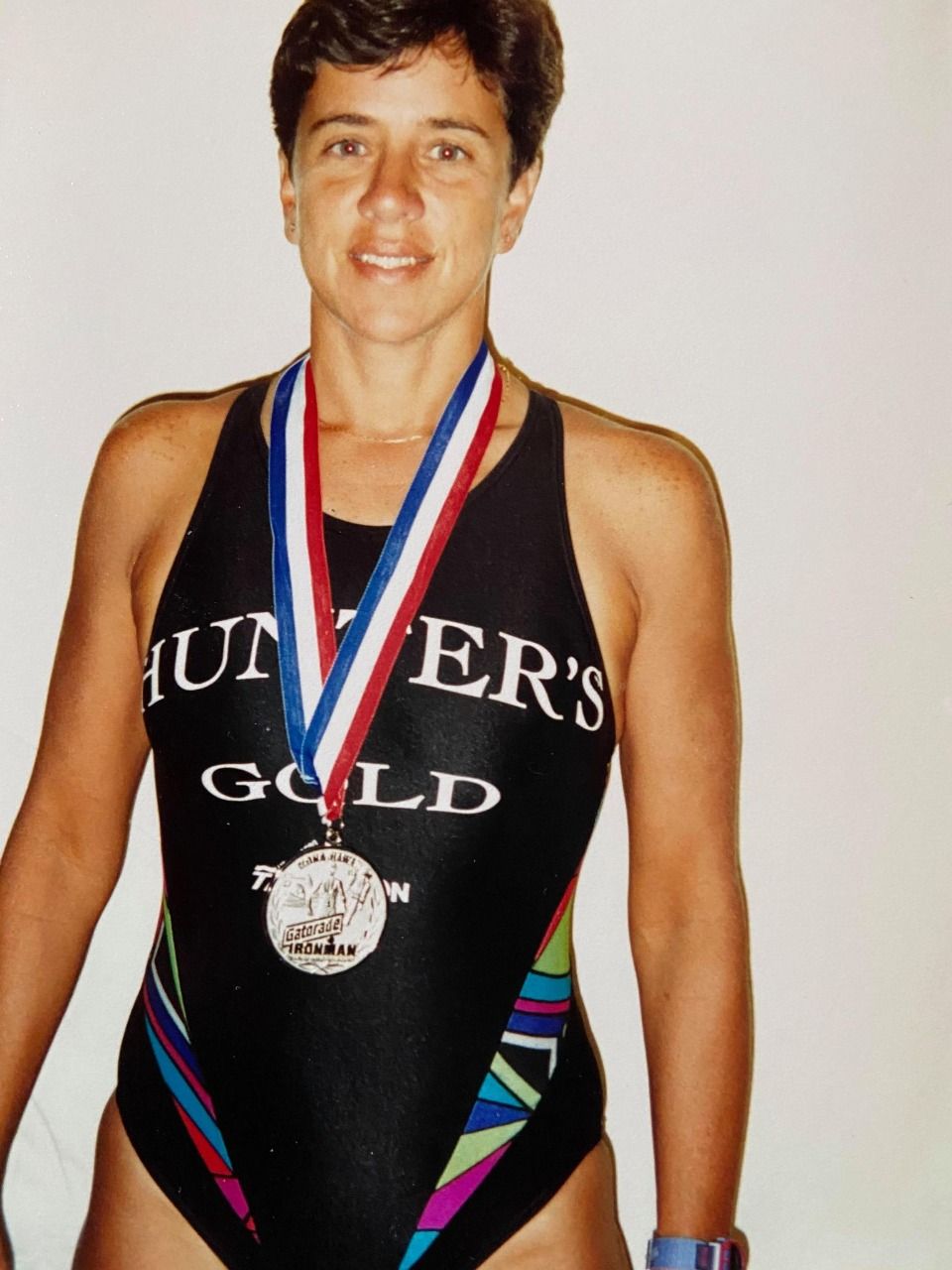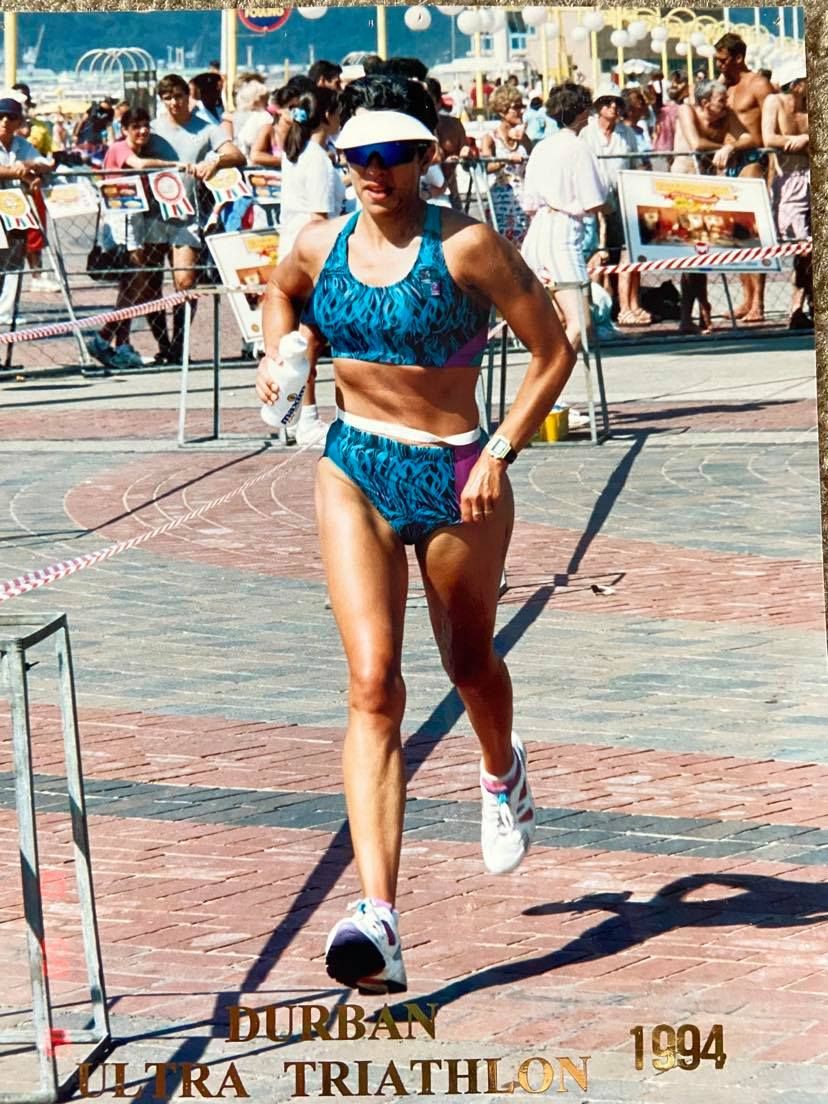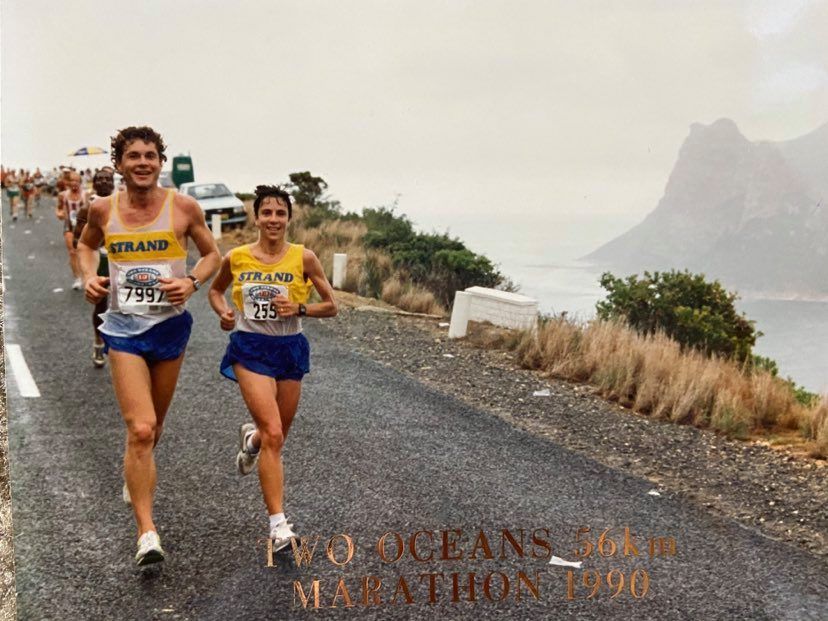Libby Burrel
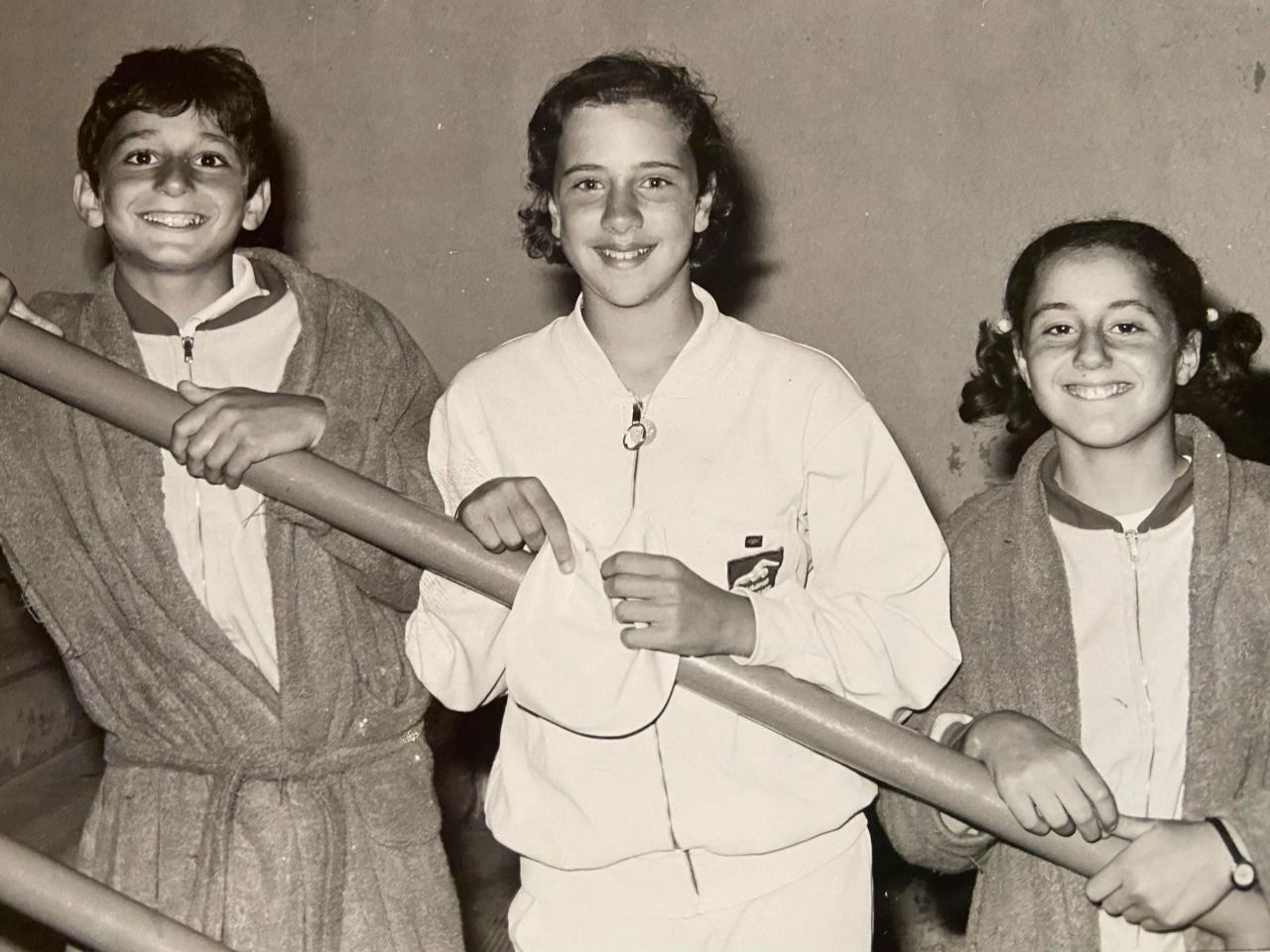
Libby Burrell as a young Eastern Province swimmer.
Libby was a breaststroke swimmer from Port Elizabeth before she ventured into coaching swimming and triathlon. Today one of the top triathlon coaches in the world.
After a stint as a swimming coach at the University of Stellenbosch, Libby ventured into triathlon coaching.
Libby served as the U.S. triathlon team leader for the 2004 Olympics and is the director of the USA triathlon national teams program. A native of South Africa, she served as South Africa's 2000 Olympic triathlon team coach.
In 2012 Triathlon Canada hired Libby Burrell as its new High-Performance (HP) Director. The South African successfully filled the same role for Triathlon South Africa and United States of America Triathlon before joining the International Triathlon Union as Director of sports development in 2006.
Read her story, or watch the video, in the interview posted below.
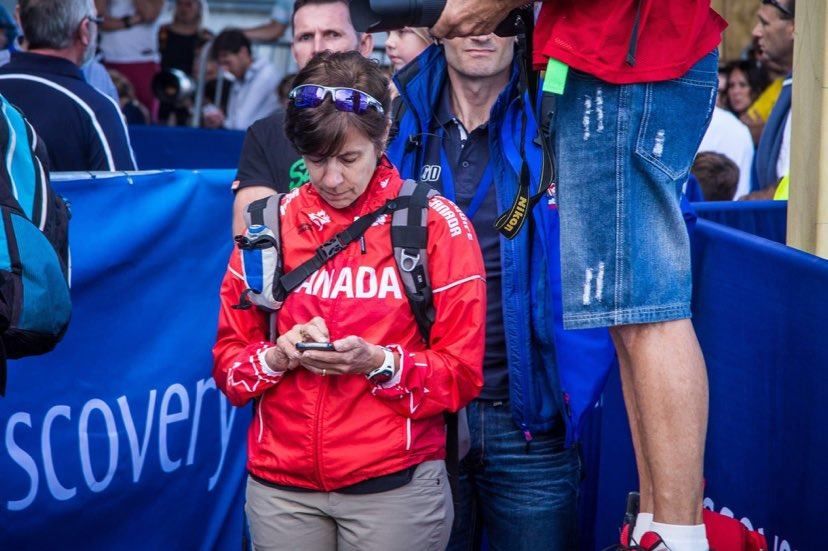
Libby Burrell was standing near the finish line in London the day Paula Findlay made her slow, anguished approach. One of Canada’s marquee athletes, Findlay was in tears as she ended her Olympic debut, 52nd among the 52 competitors to complete the triathlon: “I’m really sorry to everybody,” she said. “To Canada.”
It was, for me, a very hard thing to watch,” Burrell said.
On Tuesday, when she was announced as the new high-performance director of Triathlon Canada, Burrell moved from spectator to active participant. Part of her job will be to help elite Canadian triathletes avoid the kind of difficulty that conspired to end Findlay’s hope for a medal in London.
Burrell, an experienced South African coach and executive who moved to Whistler, B.C., almost three years ago, will begin her new job on Monday. She has been director of sport development for the International Triathlon Union since 2006, which is why she was near the finish line in London.
Findlay won five major ITU events in the two years leading up to the Olympics, including one on the Olympic course. But a hip injury and a split with her coach just weeks before the Games ultimately left her unprepared for the big moment.
It was a tough call for a young lady to go and race in an international race, her first one in 12 months, at the Olympic Games,” Burrell said. “It would be tough for Usain Bolt to have done that.”
Burrell was careful not to assign blame for what happened to Findlay in London. She said she will spend part of her first few weeks and months gathering information and listening to the sport’s Canadian stakeholders — and not just about Findlay, though her struggle in London remains an obvious talking point.
“If you have to think of a real layman’s phrase for ‘what does the high-performance director do?’ — that’s to set the coaches and the athletes up to be successful, and to help the athletes be bullet-proof on the day,” she said. “I think one could see that wasn’t there. I think they were good coaches, and I think there were probably very good plans in place. I’ll have to have a good look at why it didn’t work.”
Alan Trivett, executive director of Triathlon Canada, said he interviewed Burrell twice in person before the London Olympics, and said they talked once more over the phone after the Games. Burrell was South Africa’s triathlon coach in 2000, when the sport made its Olympic debut in Sydney, and she spent five years working with United States Triathlon until moving to the ITU.
“I’m the first to tell you that I think it was a crisis in leadership that we had in London, and that I was the ultimate leader of that team,” Trivett said. “I take a lot of that responsibility on my shoulders.”
A full-time high-performance director will not have to be distracted by the day-to-day organizational operations, he said, which could only help if a situation like Findlay’s arose again.
Trivett said Findlay is preparing for next month’s world championships at a training base in Guelph, Ont.
“She still has to address her hip issue,” he said. “She was absolutely healthy leading into the Games — and at the Games, for that matter — but that’s not to say that there isn’t some maintenance required there, or some continued work to be done.”
https://nationalpost.com/sports/triathlon-canada-calls-on-libby-burrell-for-leadership-fix
Libby Burrell
An interview with Thys Lombard - September 2020
Click here to see more video interviews of South African swimming by Thys Lombard in his Lets dive Straight in series.
Libby Burrell. So good to see you. Welcome to my little show, you've played such a massive part of my life since 1980 when I met you. Can't wait to find out what happened before 1980 because after 1980 I've been following quite a lot of your career. And it's been very interesting and we'll touch on different things from swimming to running to triathlon to just motivation. But where did it start? I know you were born of a family of four kids but your mom and dad were also incredible sportspeople so I guess it started with them, back in PE?
Libby Burrell
Yeah well I'm the youngest of four children, and probably the least illustrious of all of them as far as swimming prowess goes, but probably just carried on and persisted for longer. My dad was a great athlete. He was actually the South African Junior record holder for the Mile and he also swam. They were in the days when kids did everything at school. He did highboard living, he played hockey - field hockey, he played rugby and he was a great runner, a mile runner. The other day I sent Kobus a whole lot of the programs from his school swimming days. He was a hoarder so he collected everything, unlike me that collects nothing. My mom was a hockey player and she played a mean game of tennis she was pretty athletic in her own sense but, um, my eldest sister Wendy was a great swimmer, unfortunately, also swim in the bad times where you couldn't go to the Olympic Games. She was a South African record holder. I'm a terrible historian, but from what I know she broke South African records - 11 times. She was just a tiny little girl they used to call her the pocket battleship in the water. And she swam great.
And, and my second eldest sister, Joy was a breaststroke swimmer, my brother was a great swimmer was a breaststroke and I just followed them and it was just a long line. I think my parents decided from a young age, throw us in the water, make us tired from swimming twice a day and we have less problems at home with kids and we all just fell in love with it and that's what we did. So that's part and parcel of the Burrel family and I believe my dad's two sisters, he was the only boy in the family, were also swimmers. So there's a long line of Burrel swimmers.
TL
So at what age did you start getting professional coaching and who was your first professional coach?
Libby Burrell
I think I was just a little bitty girl that I used to sit alongside the swimming pool. When my, my siblings are swimming. I believe I swam, I started swimming with a professional coach, probably one of the legends of South African coaching, Peter Elliot. I believe I was maybe just five. When I started swimming. We were, he had the great group, Peter Elliott used to be in the textile industry and, and he was, he showed himself as being a fantastic coach and a group of people, I think my dad was part of that group, encouraged him to go all out. He built his own pool in Walmer, Port Elizabeth, and eventually a second pool and then a third teaching pool. And so I was very fortunate to be part of that group. I swam with him right up until standard nine, and then I moved over to another legendary coach, Tom Connell. He was the Grey High School coach and he bowed down and allowed a girl to join the group. I was the only girl in the group and the likes of the late Andre Kotze, Richard Maybery, and people like Andrew Dean and Kobus Scheepers, they were all part of the group and I was just the lone girl. He was a really specialist breaststroke coach as well as being a sprint coach, and I decided to experience the change before I ventured off to Stellenbosch University.
And I had always dreamt of the crazy Dutch woman from Cape Town being my coach, and I dreamt of being in Clara Aurik's squad and so I went there and got used to her prior to logging in or clocking in for my first day at Stellenbosch University, which was a culture shock for an English girl from the pukka English school going to Stellenbosch University in those days. So that's really the history and you know, Thys, one of the things that I will say is that everything that I've done in my life was a step ladder to somewhere else. I often hear now, because I think we'll speak about that later but what I do now professionally but of people who've experienced coaches that were harsh or didn't treat them well or something. I was really blessed between Peter Elliot, Tom Connell, and Clara Aurik, and then later on when I was a triathlete I just jumped into the pool with Santa van Jaarsveld. I experienced the best. And they were really my education into coaching. They taught me what I wanted to be, and what I didn't want to be as a coach and, so, even though I knew I wasn't a great swimmer, I always knew that the path was leading to something. I think I was in standard three when I decided that go to Stellenbosch and study Phys.ed and I would one day be an Olympic coach, and everybody laughed at me and said, South Africa doesn't go to the Olympics so you're wasting your time. So that was really the pathway for me.
TL
So, so, I met you in 1980 and, one of the only reasons I went to Paarl Gymnasium, which gave me so much joy, was because there was a coach in Paarl called Libby Burrell, and she had Libby's Squad with the green tracksuits. I will never forget that. So as a standard seven boy from Windhoek, myself and my sister joined your club, which I think was established about a year or two before that, from what I can remember it was already an established club.
Libby Burrell
Yeah, it was an established club actually another one and I'm not sure if you have had the opportunity to connect with Kees Jonker, who was the coach of the Paarl club - he left, and I went to teach. I was a high school teacher at Paarl Girls High, and somebody said to me, please will you coach at the club, and I kind of knew that that is what I wanted to do. I got permission from the school to also do that as a sideline activity and that's really what happened.
TL
Yeah, I mean we swim in the old Paarl swimming pool, outdoor swimming pool and I still very fondly remember our kickoff of our summer season was always at some training camp at Goudini Spa in a warm water pool. We worked really hard but we had an incredible amount of fun. I remember the Kombi trips. I mean Libby you didn't only coach, I mean you were the taxi driver, those days you would have been the Uber driver. You drove us to the galas, you gave us massages, you gave us pep talks, you know, you just, you had to do everything and I mean you were young, you were quite young, you were under 30 when you started in Paarl.
Libby Burrell
Very much so. I was very young then.
TL
A couple of naughty boys in the squad as well. I wasn't one of them but I know some of them were.
Libby Burrell
Well I know some of them, some of the kids that swam with me, had a love-hate relationship with me. They hated me at swimming during the hard workouts, but they loved me when I could give them letters for bunking out of the hostel at school. So I, we had good, we had good times there. You know, I have contact with a number of swimmers from that day, and more especially right now with Richard and David de Villers. I've got a connection with them. But, and they are very kind when they talk about the grounding that the swim club gave them. But you know I owe it to the swimmers that I had, for being able to take the path that I took. I'm not an overly confident person, but I'm a harsh harsh realist. It was hard for me to realize that I was never going to be a great swimmer but I could still with hard work become a great coach. And so that's really what I wanted to do. I'm not sure how aware you are of this one story, and obviously, you know him really. Well, and I had a set of twins at the school that I taught. And one of the twins came over to me, I never knew which one was which. And one of the Droomer twins came over to me and said, I have a little brother, and we think he can be a really good swimmer. We would like you to look at him. So I said sure, and so they invited me to the Droomer of the family home. And I met, very tiny at that stage, Noel Droomer. And I had a look at him and there was something natural about what he did in the water is a backstroker. And so I said if you. I told him and I'm sure he remembers this if you work really hard for and consistently for a long period of time, we can make something of you. And it happened to be later on in the year. Everybody went away and Noel was really worried because he said, who are you going to coach if there's nobody? Everybody's away on holiday all the borders are away? I'm like - I coach, I don't mind if one person is there or nobody's there, I turn up. And so we sat down, Benji the late Benji Droomer and myself and we plotted out how much we had to improve every single day before he could qualify for Currie Cup, and he did it. And that was the first time that I realized that if you plan really well, and I was really nervous because it was my first experience of taking somebody on that journey when you and Ellen were already established summers. So that was really kind of a fun journey. So where I am today, I owe everything to the swimmers is gave me the opportunity to experiment on them.
TL
Well, the experiment worked for all of us and I mean that's why we're still in touch. A few years ago, we heard you were coming out to South Africa and it was one or two phone calls, and I think 30 or 40 of your previously coached athletes, I mean they, they're not your swimmers, they're your friends. You have impacted our lives for so many good reasons. And I think that's why when we heard you were coming to South Africa where everybody dropped everything and they came out to that sort of reunion and that function.
Libby Burrell
Yeah
TL
You gave me a lot of time away from the study halls, which I'm very grateful for. And I drove with Noel Droomer and his dad sent a driver to pick me up at the boarding school and we. I went to Paarl to swim with you but after a year you left and you started coaching and Stellenbosch, which is I think a 30 kilometer or 40 kilometer drive away and we gladly drove through every day. And you started the indoor swimming pool, you were the first one to coach there.
Libby Burrell
Yeah, well, it's actually an interesting story. The person who was head of sport at that time, Jackie Wiese, approached me and she came actually to visit me and she said, and she was primarily involved with hockey but swimming was also in her portfolio at the sports office, and she asked me if I would be interested in starting an open club, considering that swimmers are so young, usually when they have to start out and get a good grounding. And I decided that that that would be quite a nice option because it would provide the swimmers with warm water. And so we could swim year-round, when the heater didn't go down, as you know, the heater went down often.
TL
It didn't matter we still swam, it was just cold.
Libby Burrell
What was exciting to me then is how many people decided that that I was a good option and in the end, I think you might know I limited the senior group to 25 swimmers and the junior group to 25 and I always had 20 to 30 people on the junior waiting list, so nobody could really mess around on the junior group because I could just replace them. And I was blessed with the stunning group of young swimmers. It was a pretty exciting time. I remember at Western Province Junior Championships, I had about between six and eight young boys in under 12, and then again in the under 14 section and I never knew which of the four were going to make the Western Province team because it just depended on who was on on the day, so, that was really an exciting time of my life. It was a really good move, and I was pretty sad to hear recently, that that I believe the Maties Swim Club is no more. But I'm not sure how that has developed but that was really, another great learning opportunity for me. Crazy time for me, because I'm when I started out, I was teaching Paarl, I'm sorry I was teaching at UWC, at the university, so I would drive from Paarl to some to Stellenbosch to coach, the as soon as I finished coaching the morning session that I'd go through to UWC, obviously to lecture all day. On the way home drop off and coach in the evening again, and then drive back to Paarl. So it went on six to seven days a week until we moved house to some South West.
TL
Incredible times! I mean, I remember those times so well. You also, you said you had a bunch of talented young swimmers but you also were the reason for a lot of swimmers making sort of a comeback. I remember Lee McGregor joining us, I think, Jane Weir joined us for a while, Kobus Scheepers came to swim with us, probably other names that I can't remember now.
Libby Burrell
Greg Carswell was at Stellenbosch University when he won 100 meters in Cape Town, so I take no credit for him because his coaches were absolutely awesome but he. I kind of administered the programs that he told me that he wanted to do but he was with us and yeah that was really exciting.
TL
He must have been the best looking South African 100 metres champion, ever.
Libby Burrell
Yeah. You know, I had a lot of very busy parents in the Stellenbosch Junior group who all decided to become spectators to every training session when Greg was on the pool deck.
TL
I also had a bit of a problem when I was doing surf lifesaving duties and I told my now wife who was in my girlfriend I said, I've got duty at Clifton, and she says Is Greg in your squad? then she'd always join me. Greg is a wonderful man. He's been dodging my request to be on my show, but we'll get to him very soon. He's been helping me to connect, amongst others with Jonty Skinner, so he's been a great help to me. Libby, tell me, when you moved to the University of Southern Western Cape. Eventually, you stop coaching with us but you coached there. And then all of a sudden I heard that Libby Burrell the Foot of Africa ladies Half Marathon record. How did that happen?
Libby Burrell
Well, it's kind of an interesting story. When I handed over the squad to Santa van Jaarsveld. And I just felt my swimmers were too good and I couldn't afford them the time with a full-time lecturing job. I was heartbroken really. Every evening when it was swimming time I was wondering what they were doing. Santa was really good she would keep me informed How are my swimmers who I regarded or miss as my children. And so I just decided - you remember Marietjie? Do you remember my best friend Marietjie? She said to me, why don't you do something, go run or do something. The first time I went out the front door, the furthest I could run was for seven minutes. And so I just persisted and lost weight and so I felt pretty good and I just kept myself busy, and I did the same diligence as I did with some coaching I started reading everything about it and what I needed to do and then I hooked up with a running group in the Strand, well Somerset West and the Strand. Back in those days, everybody was still running for Helderberg Harriers and I happened to be in the dentist's chair the one day when my dentist said to me that, oh you, I hear you interested in running you should come and run with our group and he's the guy that I now live with, in Canada. So we started running and we ran together and I think just the lung capacity that I had from swimming and diligence. I mean,, we are crazy people that stare at the blank line up and down for hours on end and I come from the era where we did high mileage, swimming, we were 8000 9000 meters a session. And so I just, I just grew to love it and I remember the day that I ran my first marathon I sent a picture and landed up me with the Defense Force guy, and he was also a former swimmer. And that was my first marathon and we finished in the stadium at Stellenbosch University the athletics stadium at Coetzenberg. And it was quite exciting because Santa had heard that I was running, and she let the squad out early. So all the swimmers were lined up at the end of the marathon and that was the start for me and I became hungry and then actually too hungry, because with excessive miles come injuries and. So that led me to dabble in triathlon afterward because then I could swim and bike is a relief from the running so that's basically how it happened and I still run, I run 6 to 7 times a week now at my ripe old age. I just keep going on it so that's really how it happened I was missing the swimming so much I wanted to keep myself busy.
TL
Well I can, I can testify that I never thought I could run, so running was not even in my, in my frame of mind and when, when I heard you ran the Foot of Africa and you broke the ladies Half Marathon record and ran many marathons and it always sort of stuck in the back of my head. In the army, I started running. And my first full marathon was the Foot of Africa. I thought of you and I remember you ran it, and I recently did my hundred and second half marathon when I did my hundredth my son joined he was in matric he ran his first marathon. So you, not only helping swimming and really inspired me in swimming, I can promise you, the fact that I'm running and the fact that I believe the swimmer can run. You are the reason for that as well and running has given me many many many great, great, you know, joys and then so thanks for that as well.
Libby Burrell
In fact, that was the full marathon record, the Foot of Africa. At that stage, I'm not even sure if, if the, if there was a half marathon at that stage, maybe there was. I think because I think Ilana was like 13 or so 11 or 13 when she ran it. I just remember after winning the marathon, the marathon and foot of Africa, how appalled I was because the men's winner, won a thousand rand and I won a hundred rand I remember that.
TL
It's quite an interesting debate that's currently ongoing in just about every sport and, I mean, it's reasoning, like that, that, that started the conversation, and why we have more equality now. You then mentioned triathlon and I remember you became an Olympic triathlon coach but before that, you also partook in some Ironman. Tell us how that happened?
Libby Burrell
It was really a strange thing. I went through a funny phase of my life where I felt as if, man, I really haven't achieved anything, you know, and I kind of wanted to do something unique and different and so on, and I decided to dabble a little bit in triathlon but I'll tell you exactly how it came about. One of our young swimmers and you will remember, he's not a he's a young, he's an older married man now, but he was a young swimmer, a 16-year-old, in our squad, who went to surf lifesaving championships up north in the KwaZulu Natal region, and had an accident and was paralyzed. And, yeah, Harry Bell, a delightful young man, and a super talented swimmer. And it made a huge impression on me. I visited him a long time, and then I heard that the surf lifesaving club was going to do a fundraiser for Harry, and it was going to be a triathlon. So I got myself an old Raleigh bicycle and knew that I could swim a bit and knew that I could run a bit, and did it, and was hooked. And so, I did that and then I did a couple of races in PE and I went and did the Durban Ultra and qualified to race world long-distance champs in Nice, France, and age group, old the old, the old guns and came second in my age group at World Championships. And then decided okay well, the next thing is Hawaii Iron Man, so let me try and do that so I went over first to Germany to Roth did a fantastic amazing race there. And then did Hawaii Ironman. I, unfortunately in that year, developed arterial iliac artery problems. So I was just running and competing on borrowed time and shortly after that, I had a pretty major arterial surgery. That was really the end of that for me. But during that whole time, people approached me and asked me if I would coach them. And one of those people was Conrad Stoltz who I coached for 11 years.
TL
The Caveman?
Libby Burrell
Yes, the Caveman and, and again he was my education in triathlon. He opened doors for me because he just got on with it. He let me do what I thought I needed to do and trusted me and what I always called a great keeper of his own body, so he would be able to give me really good input and feedback. And so over the years I coached and I'm I coach Conrad Stoltz and Lizel Moore to the inaugural Olympic triathlon in Sydney, and then Kate Roberts and Marie Rabie in Beijing, and several other athletes and it was during the time that I was preparing Conrad that the United States contacted me and asked me if I would take over their program. And so, I, probably the happiest days of my life workwise will always be my almost 19 years of lecturing at UWC. I love teaching. I love the students. I love the opportunities that gave and I believed in what the university stood for. So it was hard for me to pack up and go. The people that I lectured with are still some of the closest friends that I have in the whole world and I still maintain contact with them. And I went off to the United States. It was a very tough gig. And I persistent for almost five years there before returning home. But during that time I was offered a job with the International Federation as the development director to develop the sport globally and find athletes and train coaches and I did that for seven years, working in South Africa, from South Africa, because I did a lot of work in Africa and Asia. As things happened in my life and progressed I moved to Canada and continued because the head office for International Federation was in Vancouver, did a short stint with Triathlon Canada. Before I was offered an opportunity that I could not refuse in the job that I now currently hold which has absolutely nothing to do with swimming, biking, or running because I'm a high-performance director for winter sports or Winter Games so I work only with winter sports right now.
TL
That is incredible Libby. You've, you've had just such an amazing journey and such a wide variety of sports you've touched. You competed in hockey, we haven't even touched on that but I know you were a very good hockey player as well.
Libby Burrell
Not very good I played hockey and I was a goalkeeper. Actually, but I did play hockey Yes, but I was not great for sure.
TL
So, but I think that's what made you a great coach is that you were on the other side as well you know and I'm not saying that all great coaches had to be on the other side I mean it's been proven in World Cup rugby where people who didn't play for the Springboks won World Cups as coaches and so, but I always felt you and I still remember in Paarl every now and again you put on your costume you swim with us. You know, I think it's very important for someone to also feel what the person on the other side of being coached feels like so that you can have a bit of, you know, insight into that as well.
Libby Burrell
That, that was really, um, you know, multisport. Triathlon only came into being when I was almost an old lady already. Um, and I, I was fascinated by it and, and decided that there is absolutely no way that I can coach it and this I experienced it. And so, you know, but when I went over to do German Ironman and then I flew directly to Europe, and I stayed in like a little back room, where basically I could lie in my bed and my bicycle was next to me and, and I had this one plate that I cooked on and so I'm preparing myself for Hawaii. You know, and those weren't the days where we had cell phones and laptops and can connect with each other. I had to reverse charges to anybody that was actually interested in talking to me back home. And so that was an experience and that's the life that a pro athlete starts out as before they become successful. You know my story is pale in comparison to how Conrad started up and I know that Conrad's writing a book so I don't want to reveal all his stories but I mean he would if he didn't have a place to sleep, he would get a place in a cell in France at the police station and sleep in his bike bag. So, that's kind of how that the athletes thought. Often so it was hard for me as a 40 something-year-old doing that. But it was an experience that, that I put me on the right side with the athletes because I know what they're going through they're not all high money spinners.
TL
I mean the athletes just speak highly of the way you treated them. And so, so you actually, from a South African perspective, went to two Olympics with the triathletes?
Libby Burrell
I have been, I've been to a number of Olympic Games now. So I went in, and that this was an interesting story, so I went with the South African team as the coach manager of, of that, they were both my athletes and it was a kind of a sad occasion because there were many other athletes that qualified but the South African SASCOC, and those days, NOCSA, decided not to select all of them, so it could have been a bigger team so I went with Lizel and Conrad because I was a personal coach at that stage. And then I went to work in the USA so I went to Athens, as part of the as team leader for the United States team. That's when I won a to bet, wearing the American uniform, I won a bet that our men in the 4x100 freestyle relay would win gold at the Olympics. So anyway, so that that was I went to Athens. Then I went when I went to Beijing in 2008, I went as the official onsite announcer. I was the announcer, what they call the colour commentary announcer in the stadium for all television channels there. In London, I went, just as part of my role with it the ATU. That was I knew that was going to be my last gig. I did not go to Rio because I resigned from Triathlon Canada before that and moved over to winter sport, and then in 2018 I went to Pyongyang, South Korea, with the Own the Podium with Canada, as they're part of their basically just a support team for the app, the sports that I work with, I work with seven Winter Olympic sports right now.
TL
That is incredible. So your dream has come true and you are living the dream. What what's left for Libby Burrell or is there still something on the bucket list, sports-wise coaching wise as an athlete, something you want to do what's on the bucket list?
So, um, I am I feel very privileged to be in a job that I'm in. I feel it's a combination of I when I work with a sport I say, I can help you out because I've made all the mistakes in the book, and I've learned the lessons, out of all those mistakes. If you only do everything right you don't learn too much right so I feel very very privileged I, I hope to be side by side with my sports till Beijing. I'm getting long in the tooth now I'm next year I'm 65 so I'm a true senior next year. I would like to contribute to Canadian sports, as long as I can. I think you probably know that I really wanted to contribute to South African sport. But a lot of us that progressed and moved elsewhere, went back and they weren't really ready to, to take a lot of the people back, but Canada has given me a new life and so many privileges and so many opportunities and I'm, I'm, I feel as if I'm now in a second-best job in my career and I would like to contribute there as much as possible. And for me, I just want to stay healthy. For as long as I can and keep moving and keep active, I'm a terrible skier. I look like an African on a downhill slope. I like cross country skiing, but again, I'm terrible at it. I keep doing it. And here, we learn you adapt, I put crampons on shoes and I run out in the deep snow here. And just stay healthy. So I would like to give back. As much as I can. and I think if I had to have to go back to anything that I love the most. It would be coaching swimming.
I love working with young people, and very young people. I remember, and I'm allowed to mention athletes' names, I'm sure, I remember when I came across and started working with Tessa Loftus. I remember we were on the train, some of the photos I sent you of when we were at the station heading to Sasol Winter Championships in those freezing cold air and very warm water. And Tessie was about nine then, and she was swimming her first individual medley me and she had written down on a piece of paper what time she wanted to swim for each length and if so first one, and she was comma four out of one she estimated, a little. And so, just to see those kids form and develop and think and, and, you know, be cognitive about everything that they doing, I do think you have such an opportunity as a coach if you good with the kids is to shape them and help them develop. And sure I look back and many times I lie in bed thinking of mistakes I made and what I would have liked to have done better and what I would have liked to have done differently but as coaches we also human and as long as your value system is good, and you keep returning to that, then that's really the name of the game.
TL
Well, I can say it was very sad when I heard you were gonna leave South Africa and I can't say you were lost for South African sport, but you are such a big part of the history of South African swimming and for that matter, triathlon and even road running, and you've played such a major part in not just my life, in so many kids lives, who now are adults and who can now use it, and transform their kids into better people. So for that, I will be forever grateful. You've, you've played a massive part in my life, and I hope you continue to play a part in my life because I really love connecting with you. I love chatting to you. I love seeing you and keep on returning to South Africa and I'm sure you still got your house here in South Africa and I'm sure you guys will keep on coming back to drink our wines.
Libby Burrell
I most definitely will and, you know, wherever we go we make contact with the other people. I don't know when you spoke to Jonty if he told you that his office was just around the corner from mine and we used to meet up regularly. I think that if you have a look at the group of the old-time swimmers now that have connected with each other. And I can only really speak of the Eastern Province because that's was really, you know, Eastern Province, Western Province, was a large part of my life. My dad was president of swimming there and was kind of, kind of a role model for a lot of us, but we still keep in touch, all of those people that I swim with we still keep in touch and, and I think that that's the most important thing it's not just you, you train with somebody and then they move off. But one of the things that we expect as coaches you know some of the people you'll maintain contact with. And some people will just move on but the impression that they've left on you remains with you forever. And I think that's really how I see it. I'm getting on that side of my life now that I keep thinking about what could I have done better. And so now, I tried to focus on what can I do now. And what can I do playing it forward?
TL
This is the first of many talks I think we need to chat again, there's just so much that you've given to the sport and that you continue to give to the sport. Thanks so much for your time, love to have you come back to South Africa and we can have a proper catch-up
Libby Burrell Thanks for thinking of me. Thank you. Bye.
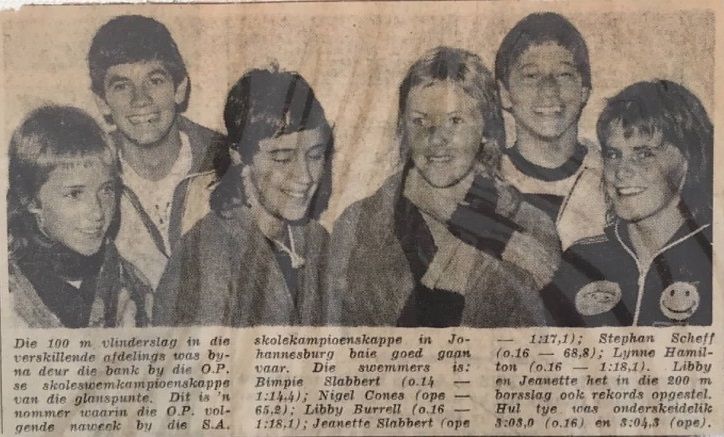
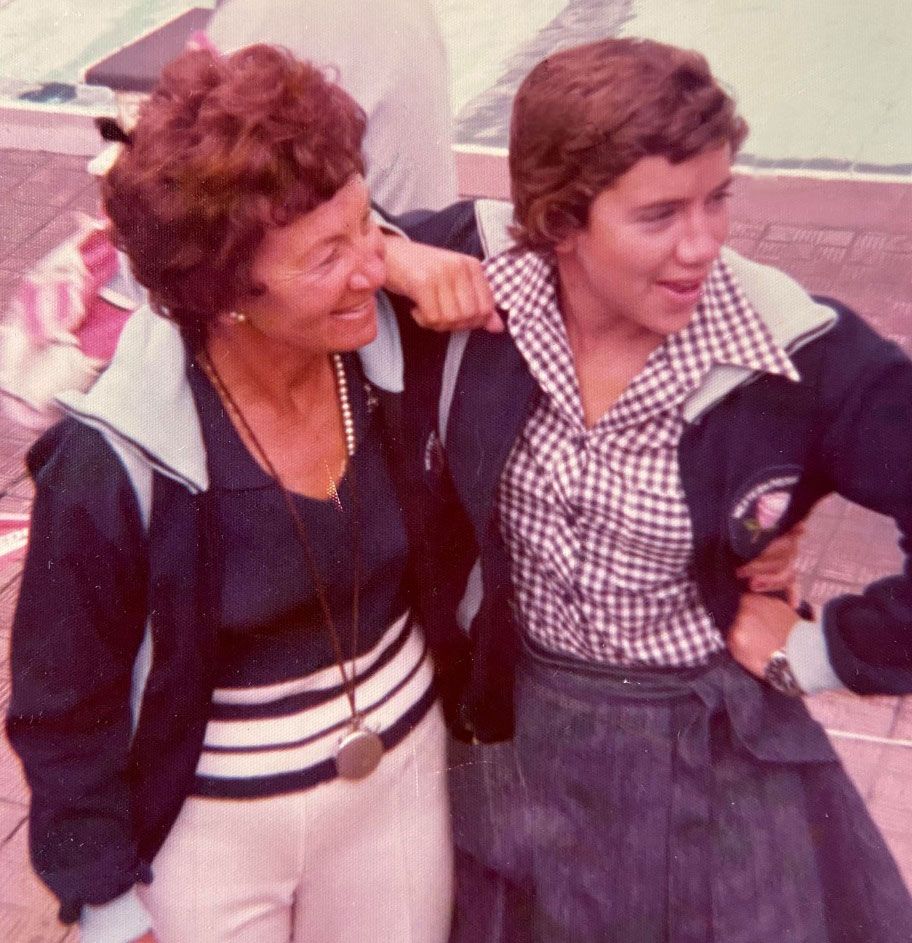
Libby Burrell with Cape Town swimming coach Clara Aurik.
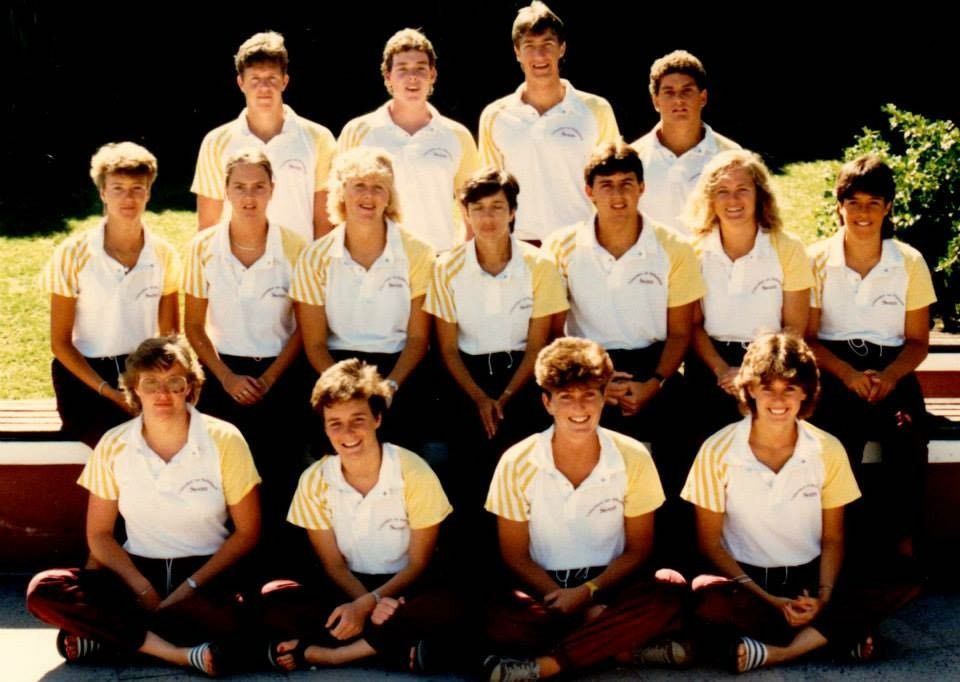
Stellenbosch University swim team
